Lasswell Harold D. The Political Writings of Harold D. Lasswell
Подождите немного. Документ загружается.

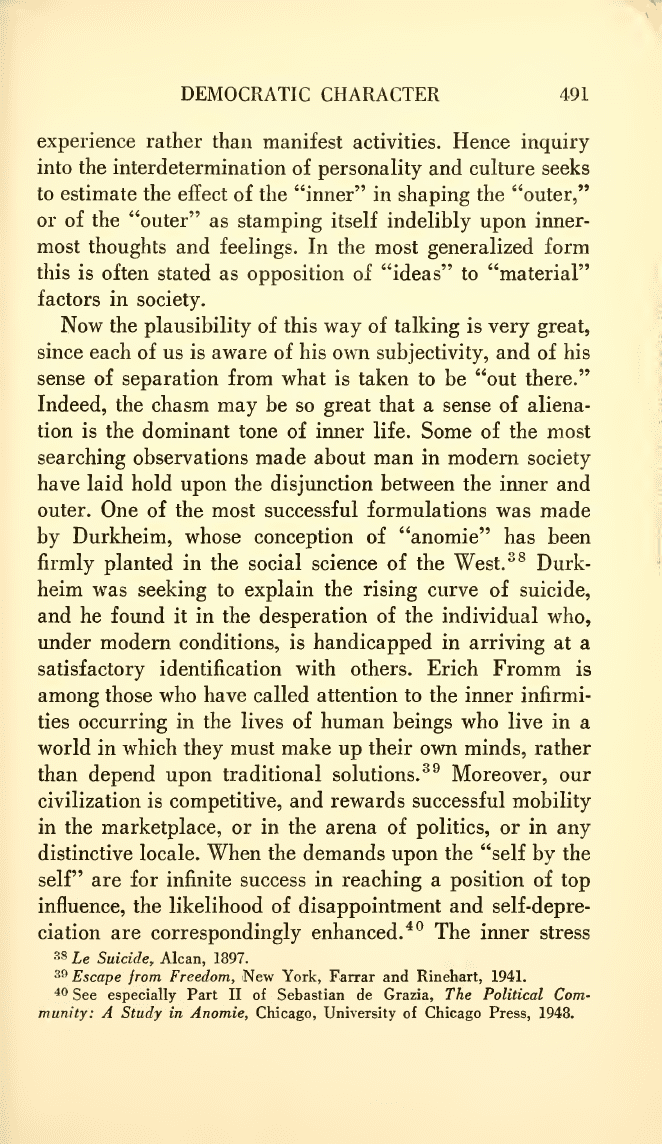
DEMOCRATIC CHARACTER
491
experience rather
than
manifest activities. Hence inquiry
into the
interdetermination
of personality and
culture seeks
to estimate
the effect
of the "inner" in shaping the "outer,"
or of the
"outer"
as stamping
itself indelibly upon
inner-
most thoughts
and feelings. In the
most
generalized form
this
is often
stated as opposition of "ideas" to
"material"
factors in society.
Now
the
plausibility
of this way of talking
is
very great,
since
each of us is aware of his own subjectivity,
and of
his
sense
of separation from what
is
taken
to be "out
there."
Indeed,
the chasm may be so great
that a sense of aliena-
tion
is the dominant tone
of
inner
life. Some of the most
searching
observations made about man in modem society
have laid
hold upon the disjunction between the
inner and
outer.
One of the most successful formulations
was made
by
Durkheim,
whose
conception
of "anomie" has been
firmly
planted in the social science of the West.^^ Durk-
heim was seeking
to
explain the
rising
curve
of suicide,
and he found it in the desperation of
the
individual
who,
under modem conditions, is handicapped
in
arriving
at
a
satisfactory identification
with others. Erich
Fromm
is
among those who have called attention to the inner infirmi-
ties occurring in the lives of human beings who
live in
a
world
in which they
must make
up
their own minds, rather
than depend upon
traditional
solutions.
^^
Moreover,
our
civilization is competitive, and
rewards
successful mobility
in the marketplace, or in the arena of politics, or in any
distinctive locale. When the demands upon the "self
by the
self"
are
for infinite
success in
reaching a position
of top
influence,
the
likelihood of disappointment and
self-depre-
ciation
are correspondingly enhanced.*^ The inner
stress
38
Le
Suicide, Alcan, 1897.
39
Escape
from
Freedom, New
York, Farrar and Rinehart, 1941,
40
See
especially Part II of Sebastian
de
Grazia, The Political
Com-
munity:
A
Study
in Anomie, Chicago, University of Chicago Press, 1948.
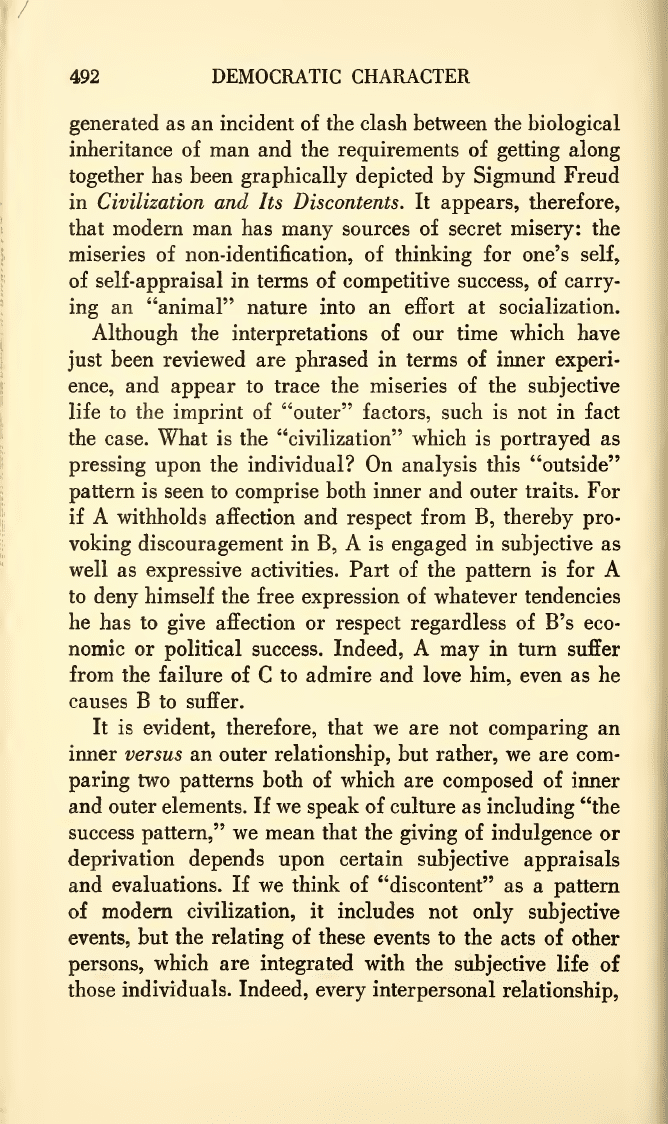
492 DEMOCRATIC CHARACTER
generated
as an incident of the
clash
between
the biological
inheritance
of man and the
requirements
of
getting
along
together
has been
graphically depicted
by
Sigmmid Freud
in Civilization and Its Discontents. It appears, therefore,
that modem man has many sources of secret misery: the
miseries of non-identification, of thinking for one's
self,
of self-appraisal in terms
of
competitive success, of
carry-
ing an
"animal" nature into an
effort
at
socialization.
Although
the interpretations of our time
which
have
just been reviewed are phrased in terms of inner
experi-
ence, and appear to trace the miseries of the subjective
life to the imprint
of "outer" factors, such is not in fact
the case. What is the "civilization" which is
portrayed
as
pressing
upon the individual? On analysis this "outside"
pattern is seen
to
comprise both inner and outer traits. For
if A withholds affection
and
respect from B, thereby pro-
voking discouragement
in B,
A
is
engaged
in
subjective
as
well
as
expressive
activities.
Part of
the
pattern is for A
to deny himself the free expression
of
whatever tendencies
he
has
to
give affection or respect regardless of B's eco-
nomic or
political success. Indeed, A may in turn suffer
from
the failure of
C to
admire and
love
him, even as
he
causes
B to suffer.
It is evident,
therefore, that we are not comparing
an
inner versus
an outer
relationship,
but rather,
we
are
com-
paring two
patterns
both
of which are composed
of inner
and outer elements. If we
speak of culture as including
"the
success
pattern,"
we mean that the
giving
of
indulgence
or
deprivation depends upon certain
subjective
appraisals
and evaluations. If we
think
of "discontent"
as
a pattern
of modem
civilization,
it includes
not only
subjective
events,
but the relating of these
events to
the acts
of other
persons, which
are
integrated
with the
subjective
life
of
those
individuals. Indeed, every
interpersonal
relationship,
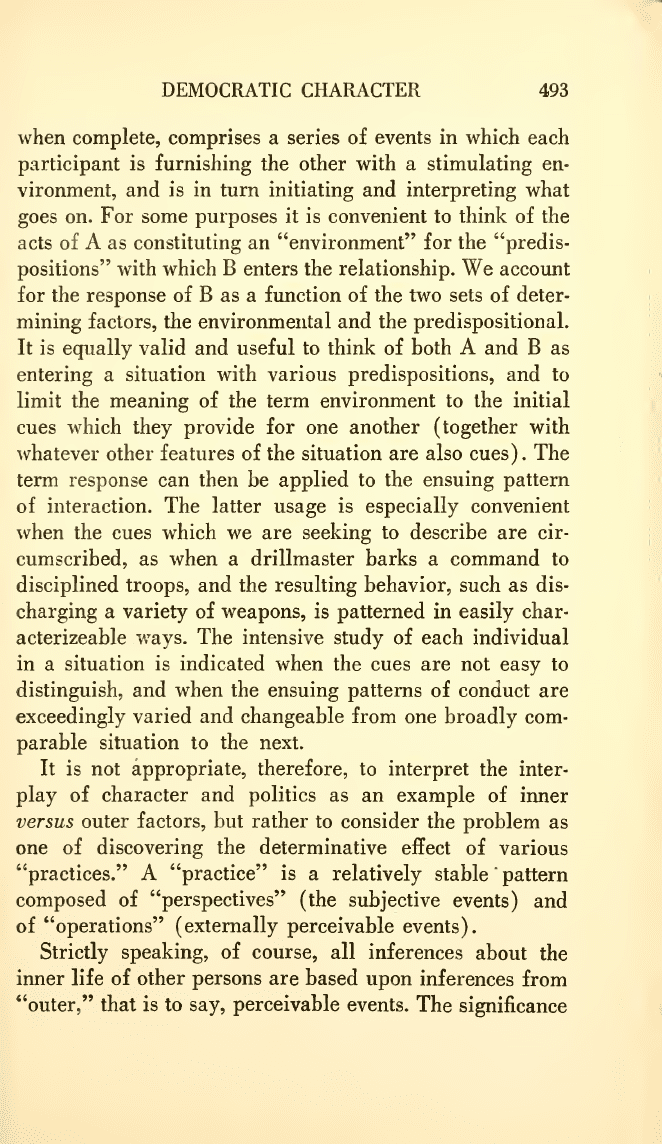
DEMOCRATIC
CHARACTER
493
when
complete,
comprises
a series of
events in which
each
participant is furnishing
the
other with
a
stimulating en-
vironment, and is
in turn initiating
and
interpreting
what
goes
on. For
some purposes
it is convenient
to think
of the
acts of A as
constituting
an "environment"
for the "predis-
positions" with
which B
enters the
relationship.
We account
for the response of B as a
function of the two sets
of
deter-
mining factors, the environmental and the
predispositional.
It is
equally
valid and useful to
think
of both
A and B
as
entering
a
situation with various predispositions, and to
limit
the
meaning of
the
term environment to the initial
cues
which
they provide
for
one
another (together with
whatever
other features of the
situation are
also
cues). The
term response can then
be
applied to the
ensuing pattern
of interaction. The latter
usage
is especially convenient
when the cues
which
we
are seeking to describe are cir-
cumscribed,
as when a
drillmaster barks
a
command
to
disciplined troops,
and the
resulting behavior,
such as
dis-
charging a variety of weapons, is patterned in easily char-
acterizeable ways. The intensive
study of each individual
in
a
situation is indicated when
the cues are not easy to
distinguish, and when the ensuing patterns
of conduct are
exceedingly varied and changeable from
one broadly com-
parable situation to the
next.
It is not
appropriate, therefore,
to interpret
the inter-
play of
character and politics
as an
example of inner
versus outer factors, but rather
to consider
the problem
as
one of
discovering the determinative
effect
of
various
"practices." A
"practice" is
a relatively
stable '
pattern
composed of
"perspectives"
(the subjective
events)
and
of
"operations" (externally
perceivable
events).
Strictly
speaking, of course, all
inferences
about
the
inner life of
other persons
are based
upon
inferences
from
"outer," that is to
say, perceivable
events.
The
significance
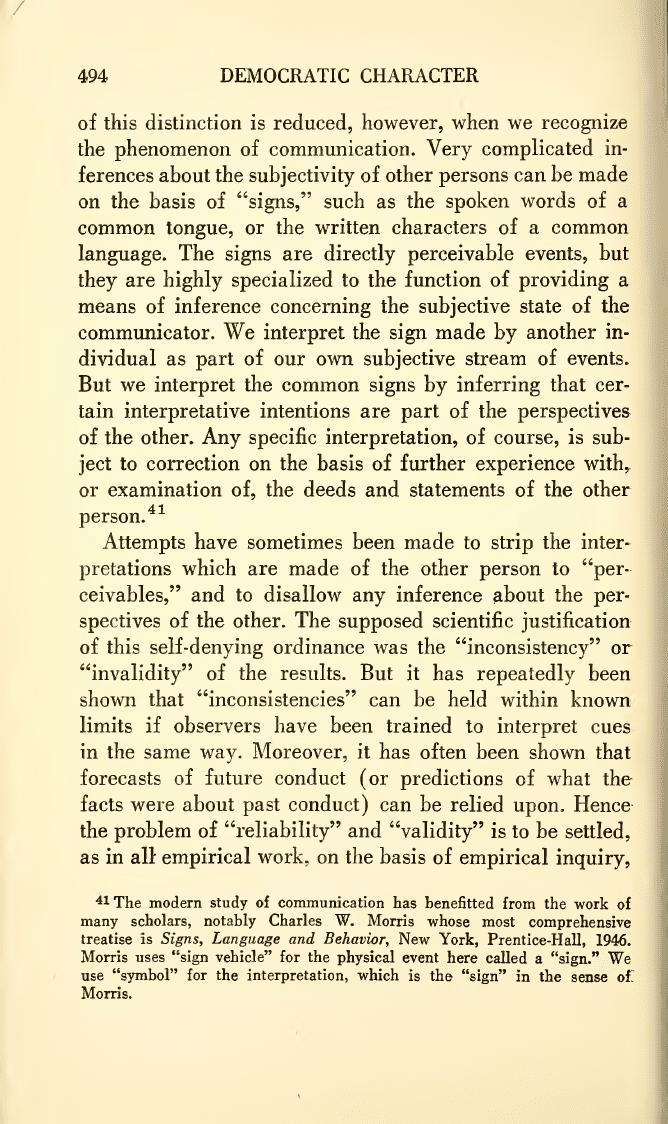
494
DEMOCRATIC CHARACTER
of this
distinction
is reduced,
however, when we
recognize
the
phenomenon of communication.
Very
complicated in-
ferences about the subjectivity of
other persons can be
made
on the basis of
"signs," such
as
the
spoken words of a
common tongue, or
the written characters of
a common
language.
The signs are directly perceivable
events, but
they
are highly specialized to the
function of providing
a
means of inference concerning the
subjective state of the
communicator. We interpret the
sign
made by
another in-
dividual as
part of
our own
subjective stream of events.
But we
interpret the common signs by inferring that
cer-
tain
interpretative intentions are part
of
the perspectives
of
the other. Any specific interpretation, of course, is sub-
ject
to correction on the basis of further experience with,^
or
examination of, the deeds and statements of the other
person.*^
Attempts have sometimes been made to strip the
inter-
pretations which are
made of the other person to
"per-
ceivables," and to disallow any inference about the per-
spectives of the other. The
supposed scientific
justification
of this self-denying ordinance was the "inconsistency"
or
"invalidity" of the results. But it
has
repeatedly
been
shown
that "inconsistencies"
can be held within
known
limits if observers
have been trained to interpret
cues
in
the same way. Moreover,
it has often
been shown that
forecasts of
future
conduct (or
predictions
of what the
facts
were about past conduct)
can be
relied upon. Hence
the
problem of
"reliability"
and
"validity"
is to be
settled,
as
in
all
empirical
work,
on the basis
of empirical
inquiry,
•*^The
modern
study
of
communication
has
benefitted
from the work
of
many
scholars,
notably
Charles W.
Morris
whose
most
comprehensive
treatise is
Signs, Language and
Behavior,
New York,
Prentice-Hall,
1946.
Morris uses
"sign vehicle"
for the
physical event
here
called
a "sign."
We
use
"symbol" for
the
interpretation,
which
is the "sign"
in the
sense of
Morris.
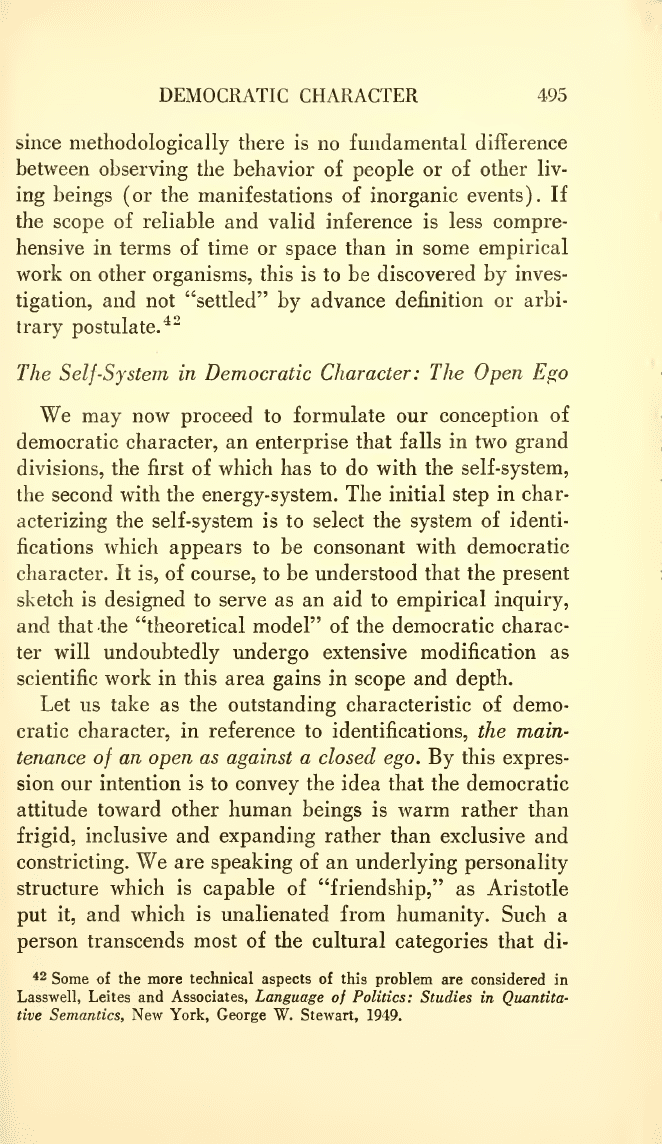
DEMOCRATIC
CHARACTER
495
since methodologically
there is
no
fundamental difference
between observing
the
behavior of
people
or
of other
liv-
ing
beings (or
the manifestations
of
inorganic events).
If
the scope
of
reliable
and
valid
inference
is
less
compre-
hensive in terms of time
or space
than in some
empirical
work
on other organisms, this
is to be
discovered by
inves-
tigation, and not "settled"
by advance
definition or
arbi-
trary
postulate.^"
The
Self-System
in Democratic
Character:
The Open Ego
We may now proceed to formulate our
conception of
democratic character, an enterprise that
falls in two
grand
divisions,
the
first of which has to do with the
self-system,
the second with the energy-system. The initial step
in
char-
acterizing the self-system
is to
select the system of
identi-
fications which appears
to be
consonant with
democratic
character. It
is,
of course,
to be
understood that the
present
sketch is designed
to
serve
as an
aid
to
empirical
inquiry,
and that the "theoretical model"
of
the democratic charac-
ter will undoubtedly undergo extensive modification as
scientific work in this area gains
in scope and
depth.
Let us
take
as the outstanding characteristic
of demo-
cratic character, in
reference
to identifications, the main-
tenance
of
an open as against a closed ego. By this expres-
sion our intention
is
to convey the idea that
the
democratic
attitude
toward other human
beings is warm rather than
frigid,
inclusive and expanding rather
than exclusive and
constricting. We are speaking
of an
underlying
personality
structure
which is
capable of "friendship,"
as Aristotle
put it,
and which is unalienated
from humanity.
Such
a
person transcends most of the cultural
categories
that di-
42
Some of the more
technical aspects
of this
problem are
considered
in
Lasswell, Leites and
Associates,
Language
of
Politics:
Studies
in
Quantita-
tive Semantics, New York, George W.
Stewart,
1949.
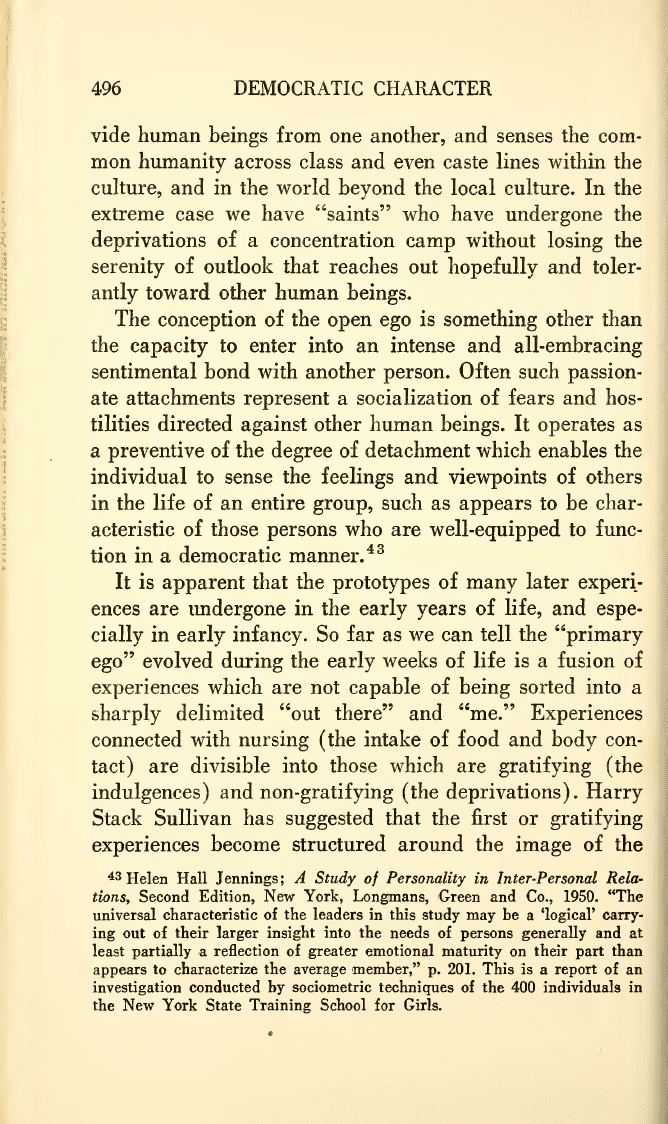
496
DEMOCRATIC
CHARACTER
vide human
beings from one another, and senses the
com-
mon humanity across class
and even caste
lines
within the
culture, and in the world beyond the
local
culture.
In the
extreme
case we have "saints" who have undergone
the
deprivations
of a concentration camp without
losing the
serenity
of outlook that reaches
out hopefully and
toler-
antly
toward other human beings.
The conception of the open ego is
something other
than
the
capacity to enter into an intense
and all-embracing
sentimental
bond
with another person. Often such passion-
ate attachments represent
a
socialization
of
fears and hos-
tilities directed against other human beings. It operates as
a
preventive of the degree of detachment which enables the
individual to sense the feelings and viewpoints
of
others
in
the life of an entire group, such as appears
to be
char-
acteristic of those persons who are well-equipped
to
func-
tion in a
democratic manner.
^^
It is apparent that the
prototypes of many later experi-
ences are imdergone in the early
years
of
life, and
espe-
cially in early infancy. So far as
we can tell the "primary
ego" evolved during the
early weeks
of
life is a fusion
of
experiences which are not
capable
of being sorted into
a
sharply delimited "out there" and "me." Experiences
connected
with
nursing
(the intake of food and body con-
tact)
are divisible into
those which
are
gratifying
(the
indulgences) and
non-gratifying (the deprivations). Harry
Stack
Sullivan has
suggested that
the
first
or
gratifying
experiences become
structured around the
image of the
43
Helen
Hall Jennings;
A Study
of
Personality in Inter-Personal Rela-
tions, Second
Edition, New
York,
Longmans, Green and
Co., 1950.
"The
universal
characteristic of the leaders in this study
may be
a
'logical' carry-
ing out of
their larger
insight into the
needs of persons generally and at
least
partially
a
reflection
of greater emotional maturity
on
their part than
appears to
characterize the average member,"
p.
201.
This
is
a
report
of an
investigation conducted by
sociometric
techniques of the 400 individuals in
the
New
York
State Training School
for
Girls.
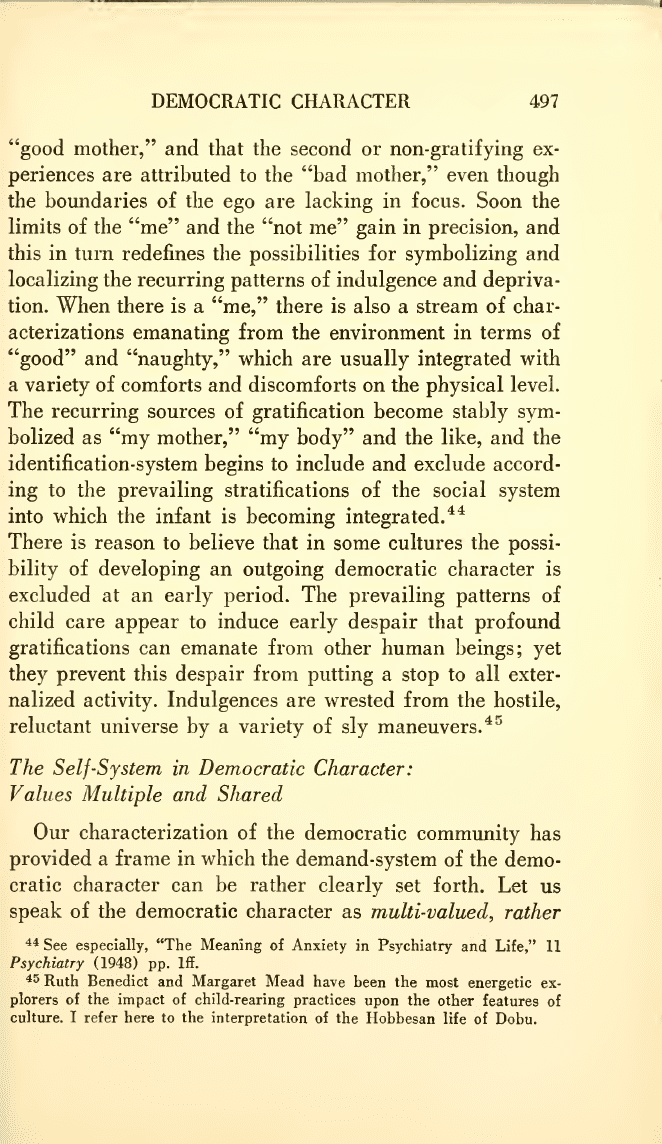
DEMOCRATIC CHARACTER
497
"good mother,"
and that the second or
non-gratifying
ex-
periences
are attributed to the "bad
mother,"
even though
the boundaries of the
ego are
lacking in focus.
Soon the
limits
of the "me"
and the "not me" gain in
precision,
and
this in turn redefines
the possibilities for
symbolizing
and
localizing
the
recurring
patterns of indulgence and depriva-
tion. When there
is a "me," there
is
also
a
stream of char-
acterizations
emanating from the environment in terms of
"good"
and
"naughty," which are usually integrated
with
a variety
of comforts and discomforts on the physical
level.
The recurring
sources of gratification become stably sym-
bolized
as "my mother," "my body" and the
like,
and the
identification-system
begins to include and exclude accord-
ing to the prevailing
stratifications of the social system
into which the
infant is becoming integrated.^*
There is reason
to believe that in some cultures the
possi-
bility
of developing
an outgoing democratic character is
excluded at an early
period. The prevailing patterns
of
child care
appear to induce early despair that
profound
gratifications can emanate from
other human beings;
yet
they prevent this despair from putting
a stop to all exter-
nalized activity. Indulgences are
wrested
from
the hostile,
reluctant universe
by a variety
of
sly
maneuvers.'*^
The
Self-System
in Democratic
Character:
Values Multiple and
Shared
Our
characterization
of the
democratic
community
has
provided
a frame
in which
the
demand-system
of the
demo-
cratic character can be rather
clearly
set forth.
Let
us
speak
of the
democratic
character
as
multi-valued,
rather
^^
See
especially, "The Meaning
of Anxiety
in Psychiatry
and Life,"
11
Psychiatry
(1948)
pp.
Iff.
^5
Ruth Benedict and Margaret
Mead have
been the
most energetic
ex-
plorers of the impact of child-rearing
practices
upon the other
features
of
culture. I refer here to the
interpretation
of the
Hobbesan
life of
Dobu.
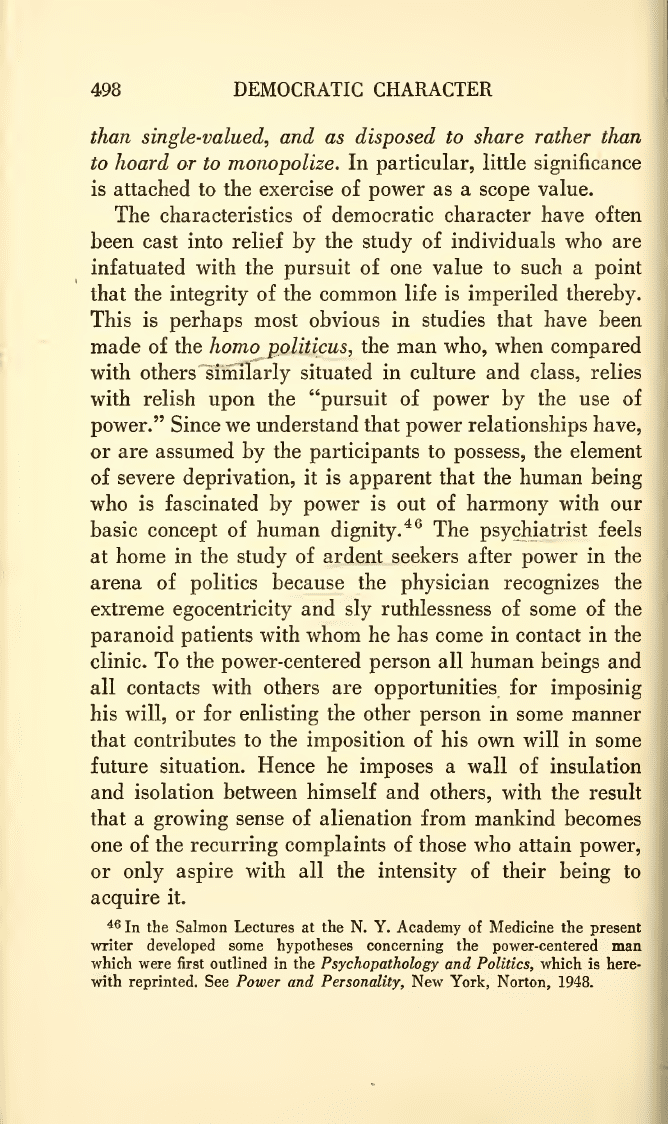
498 DEMOCRATIC CHARACTER
than
single-valued, and
as
disposed to
share rather than
to hoard
or to
monopolize. In particular, little
significance
is attached to the exercise of
power
as a scope
value.
The
characteristics of democratic character have often
been
cast into
relief
by
the study of individuals who are
infatuated with the pursuit of one value to such a
point
that
the integrity of the common
life
is
imperiled thereby.
This is perhaps most obvious in
studies that have been
made of the homo politicus, the man who,
when compared
with others similarly
situated
in
culture and class, relies
with
relish
upon
the "pursuit
of
power by the use of
power."
Since we
understand that power relationships have,
or
are
assumed by
the participants to possess, the element
of
severe deprivation,
it
is apparent that the human
being
who
is fascinated by power is out of harmony with our
basic concept of human dignity.^® The psychiatrist feels
at
home in the study of ardent
seekers
after power in
the
arena of politics because the physician recognizes the
extreme egocentricity and sly
ruthlessness
of some of the
paranoid
patients
with whom he has come in contact in the
clinic. To the
power-centered person
all human beings and
all
contacts
with
others are
opportunities for imposinig
his
will, or for enlisting the other
person in some manner
that
contributes to the imposition of
his own will in some
future situation. Hence he imposes
a wall of insulation
and isolation between himself and others,
with the result
that
a
growing
sense
of alienation from mankind
becomes
one of the
recurring complaints
of those who
attain
power,
or only
aspire with all the intensity
of their being
to
acquire
it.
^6
In the Salmon Lectures at the
N. Y.
Academy
of Medicine the present
writer developed some hypotheses concerning
the power-centered
man
which were first outlined in the Psychopathology
and
Politics,
which is here-
with reprinted.
See
Power
and
Personality, New
York, Norton,
1948.
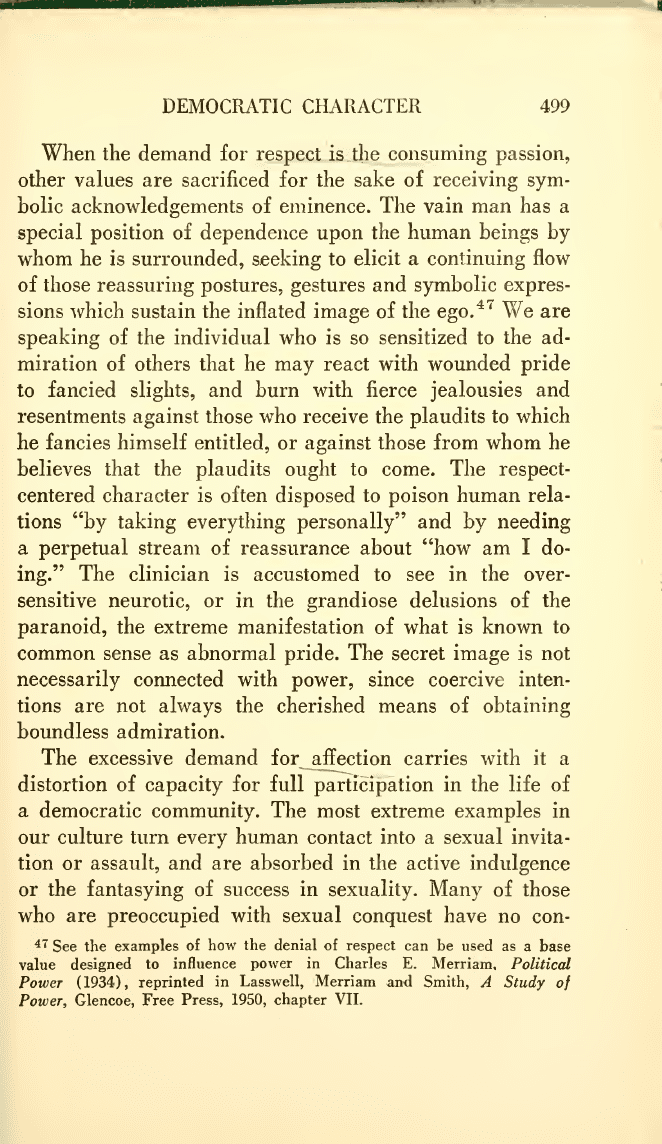
tuam
DEMOCRATIC
CHARACTER 499
When the demand
for respect is
the
consuming passion,
other values are sacrificed for the
sake
of
receiving sym-
bolic acknowledgements of eminence.
The vain man has
a
special
position of dependence upon
the human beings
by
whom he is surrounded, seeking to
elicit
a
continuing flow
of those reassuring postures, gestures
and symbolic
expres-
sions
which sustain the inflated image of the
ego.*' We are
speaking
of the individual who is so
sensitized
to
the ad-
miration
of others that he may react with
wounded pride
to fancied slights, and burn with fierce jealousies
and
resentments against those who receive the plaudits to
which
he fancies himself entitled, or against those from whom he
believes that the plaudits ought to come. The respect-
centered character is often disposed to poison human rela-
tions
"by
taking everything personally" and
by
needing
a
perpetual stream
of
reassurance
about "how
am I
do-
ing."
The clinician
is
accustomed
to see
in
the
over-
sensitive neurotic,
or in the
grandiose
delusions of
the
paranoid,
the extreme manifestation of what is known
to
common sense
as abnormal pride. The secret image is not
necessarily
connected with power, since coercive inten-
tions are
not always the cherished means of
obtaining
boundless admiration.
The excessive demand for affection
carries with it a
distortion
of capacity for full participation in the life of
a democratic community.
The most extreme
examples
in
our culture turn every human contact into
a
sexual
invita-
tion or assault, and are absorbed in the active
indulgence
or
the
fantasying of success in sexuality. Many
of those
who are
preoccupied
with sexual
conquest have
no
con-
^"
See
the
examples
of
how the denial
of respect
can be used
as a
base
value
designed to
influence
power
in Charles
E. Merriara.
Political
Power
(1934),
reprinted
in Lasswell, Merriam
and Smith,
A
Study
of
Power,
Glencoe, Free
Press, 1950,
chapter
VII.
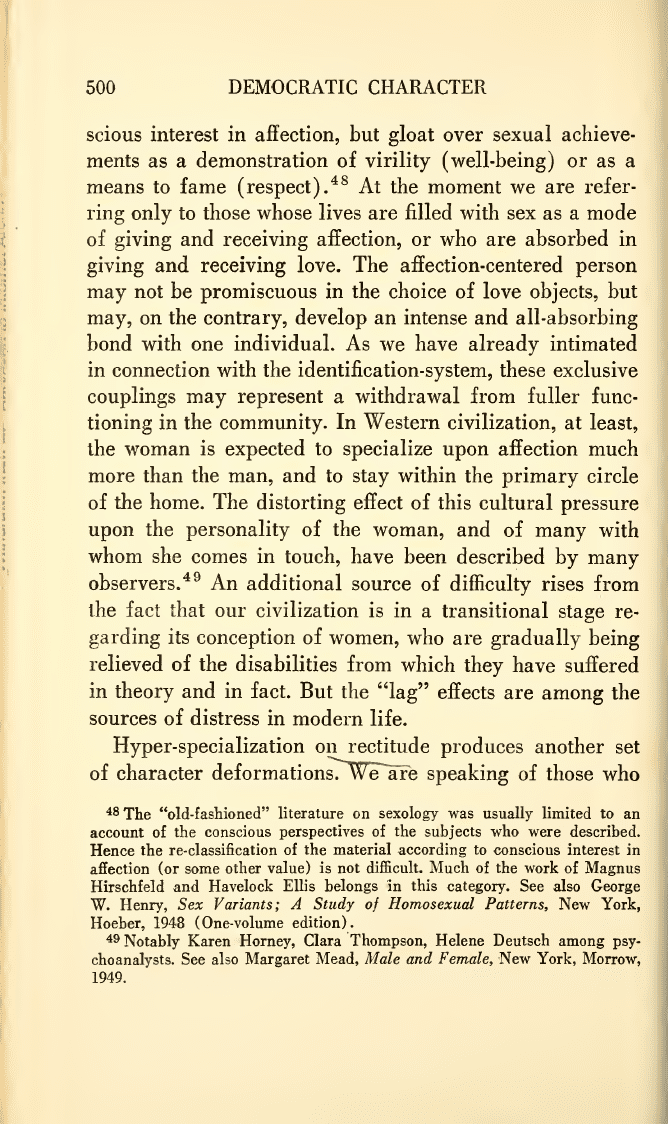
500
DEMOCRATIC CHARACTER
scious interest in
affection,
but gloat over
sexual achieve-
ments
as a
demonstration
of
virility (well-being) or
as a
means to fame (respect).*^ At the moment
we
are refer-
ring only to those
whose
lives are
filled with sex
as a mode
of
giving
and receiving
affection,
or who are
absorbed
in
giving and receiving love.
The affection-centered person
may not be
promiscuous in the choice of
love
objects, but
may, on the contrary, develop an intense and all-absorbing
bond with one individual. As
we
have already intimated
in connection with the identification-system, these
exclusive
couplings may represent
a
withdrawal from fuller
func-
tioning in the community. In Western civilization,
at least,
the
woman is expected to specialize upon affection
much
more than the man, and to stay
within
the
primary
circle
of
the home. The distorting
effect of this
cultural
pressure
upon the personality
of
the
woman, and
of many
with
whom she comes in
touch, have
been described
by many
observers.*^ An additional
source
of difficulty rises
from
the fact that
our civilization
is in a
transitional
stage re-
garding
its conception of
women,
who are gradually
being
relieved of the
disabilities
from
which
they have
suffered
in
theory
and in fact.
But the
"lag"
effects
are among the
sources of distress
in modern
life.
Hyper-specialization on rectitude
produces
another
set
of character
deformations. \Ve~a"re
speaking
of those
who
^8
The
"old-fashioned"
literature
on
sexology was usually limited
to
an
account of
the conscious
perspectives of
the subjects
who were described.
Hence
the
re-classification of
the material according to
conscious interest in
affection
(or some
other
value) is not
difficult.
Much of the work
of Magnus
Hirschfeld
and
Havelock Ellis belongs in
this category.
See also George
W.
Henry,
Sex
Variants; A Study
of
Homosexual Patterns, New
York,
Hoeber,
1948 (One-volume
edition).
49
Notably Karen
Horney, Clara
Thompson, Helene Deutsch
among psy-
choanalysts. See
also
Margaret Mead, Male and
Female,
New York, Morrow,
1949.
